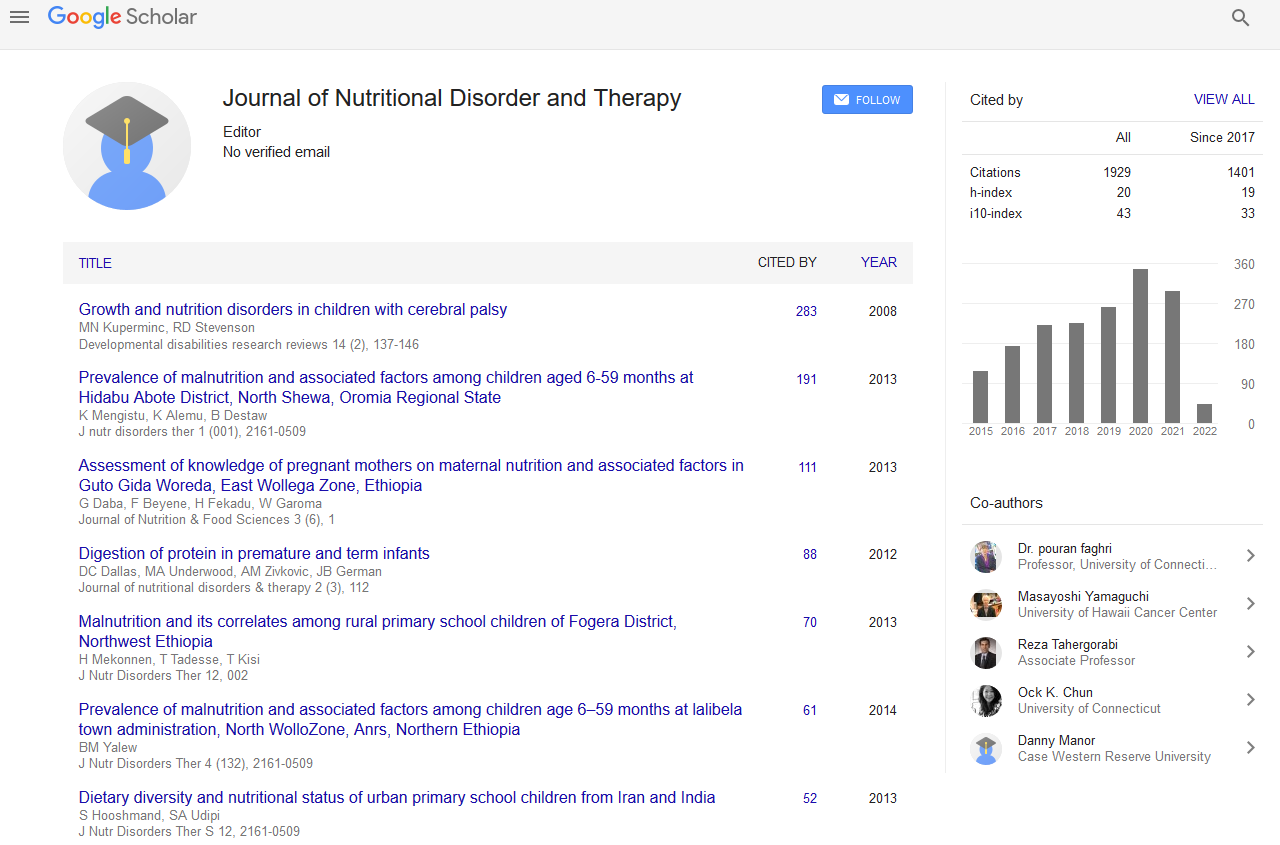Indexed In
- Open J Gate
- Genamics JournalSeek
- Academic Keys
- JournalTOCs
- Ulrich's Periodicals Directory
- RefSeek
- Hamdard University
- EBSCO A-Z
- OCLC- WorldCat
- Publons
- Geneva Foundation for Medical Education and Research
- Euro Pub
Useful Links
Share This Page
Journal Flyer

Open Access Journals
- Agri and Aquaculture
- Biochemistry
- Bioinformatics & Systems Biology
- Business & Management
- Chemistry
- Clinical Sciences
- Engineering
- Food & Nutrition
- General Science
- Genetics & Molecular Biology
- Immunology & Microbiology
- Medical Sciences
- Neuroscience & Psychology
- Nursing & Health Care
- Pharmaceutical Sciences
Effects of a 6-month green and black tea intervention on inflammatory cytokines: Role of gender and smoking
15th International Conference on Clinical Nutrition
May 24-26, 2018 | Vienna, Austria
Iman A Hakim
University of Arizona, USA
Keynote: J Nutr Disorders Ther
Abstract:
Background: Chronic inflammation has been implicated as an important modulator of human health by playing a significant role in both disease prevention and disease development. Several studies have demonstrated increased Interleukin 6 (IL-6) and C-Reactive Protein (CRP) in the blood of smokers. Our goal, that was addressed over a four year study period, was to determine the effects of high tea consumption on biological markers of chronic inflammation that mediate lung cancer risk, including, IL-6, CRP and antioxidant enzyme activities. Methods: We completed a six month randomized, controlled, double-blinded trial in a group of current and former smokers. Participants were stratified on smoking status and gender, and were randomized to green or black tea preparations or a control intervention (matching placebo). Levels of plasma IL-6 and CRP were used to measure chronic inflammation. Results: A total of 138 participants (78 females and 60 males) participated in the study. Our data showed that IL6 is significantly correlated with years of smoking and pack/year among smokers and former smokers. At the end of the six month intervention, female smokers in the green tea group showed a significant decrease in IL-6 (P=0.036) while male former smokers in the black tea group showed a significant decrease in CRP levels (P=0.012). There were no significant changes in dietary and serum antioxidant levels between the different groups. Conclusion: This data implies that smokers are more likely to benefit from green tea intake, while the beneficial effects of black tea are observed among former smokers.
Biography :
Iman A Hakim is the Dean of the College of Public Health at the University of Arizona (UA). She is the Mel & Enid Zuckerman Endowed Chair in Public Health and the Founding Director of the Global Health Institute at UA. She is a Member of the UA Cancer Center and Sarver Heart Center. She holds joint appointments in the Department of Family and Community Medicine at the UA College of Medicine and Departments of Nutrition at UA. She is internationally known for her translational research and work on the role of bioactive food compounds such as green tea and d-limonene in modulation of oxidative damage and prevention of chronic diseases such as cancer, cardiovascular diseases, and diabetes. She has spoken at numerous national and international conferences. Her research focuses on health promotion, dietary interventions, and the role of gene-environment and gene-nutrition interactions in chronic disease prevention. She has been the Principal Investigator of several clinical trials focused on nutrition, cancer prevention, and coronary heart disease, chemoprevention of lung carcinogenesis using green tea; dietary interventions to study the effects of tea consumption on smoking-related oxidative stress and role of d-limonene and citrus-cancer association in Mediterranean diet.
Email:ihakim@email.arizona.edu


